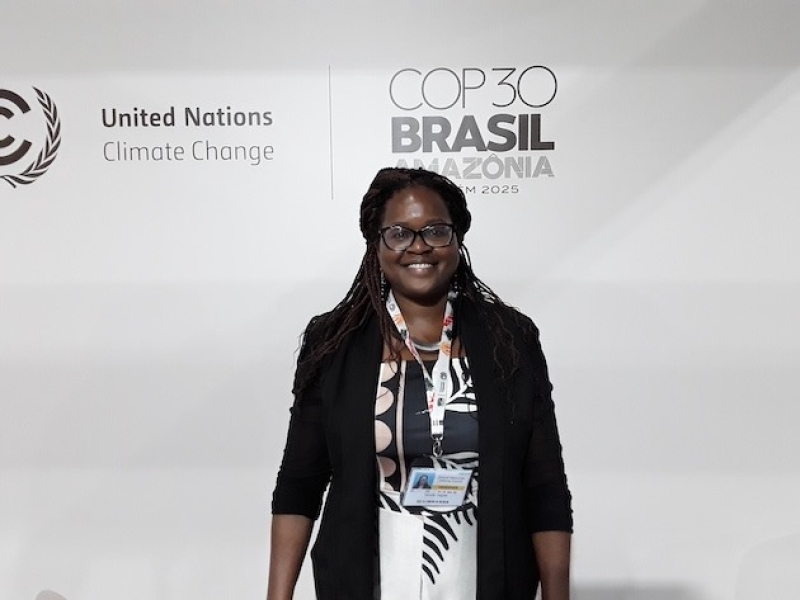- COP 30 ends with delicate Belem Political Package amid drama |
- Khaleda urges all to pray for her amid health concerns |
- Bangladesh embrace agroecology to combat chemical overuse: Experts |
- China warns Japan after ‘red line’ crossed on Taiwan |
- Capital market rebounds on week’s first trading day |
COP30 Seen as Diplomacy in Action, Says Climate Observer

Yamide Dagnet, Senior Vice President, International at the Natural Resources Defense Council.
As observers at the Conference of the Parties closely monitored proceedings in Belém, many—including Yamide Dagnet—approached the UN Climate Summit as an “implementation COP,” calling for tangible signals to trigger urgent climate action before the crisis reaches irreversible levels.
For Dagnet, Senior Vice President for International Affairs at the Natural Resources Defense Council (NRDC), it is an all-hands-on-deck moment. She stressed that negotiations must translate into action on the ground, and that real-world progress should shape the acceleration expected from upcoming discussions.
“As COP focuses more on how we do things, we know the stakes will be more complex,” said Dagnet. “This is why the Paris Agreement established five-year policy cycles—acknowledging that we might not get everything right the first time despite good intentions and the possibility of unintended consequences and trade-offs.”
A former negotiator who now oversees NRDC’s international programme, Dagnet understands the scale of the challenges ahead. She noted that with rising geopolitical tensions and development priorities remaining central, “we are not dealing with just a climate COP but a socio-economic COP.” To succeed, she said, the multilateral process must be designed to be just, inclusive, and participatory.
Dagnet believes cooperation among nations and regions is still moving in the right direction despite the United States’ withdrawal from the Paris Agreement. “This COP was about diplomacy in action. Only one country has withdrawn; the rest remain broadly on course. Many issues could make or break the conference, including scaling up finance for adaptation and for limiting loss and damage. To manage these challenges, you need measurement—and that requires indicators that help shift us from risk assessments to opportunity frameworks and value creation.”
However, she cautioned that mobilisation cannot be left to governments alone. “It requires support from multilateral and domestic financial institutions, as well as private capital. For too long, the private sector viewed climate-adaptation finance as yielding no economic return, but the tide is turning. Insurance companies, asset managers, pension funds, commercial developers, and SMEs increasingly see adaptation as essential. We must show how adaptation can save vast financial resources.”
She noted that investment and insurance models must be redesigned for climate-driven realities. Traditional insurance relies on events being rare, she said, but climate disasters are becoming far more frequent.
Holding COP30 at the mouth of the Amazon—near the world’s largest tropical forest—adds symbolic weight and creates opportunities to explore new ways of valuing nature and funding resilience for ecosystems and communities.
Addressing whether activism and lobbying influenced negotiations, Dagnet said fossil-fuel lobbyists have long felt threatened by the Paris Agreement and have used COP spaces to delay the transition. Analysis shows that one in 25 COP30 participants represented the fossil-fuel industry, with more than 1,600 lobbyists attending.
Indigenous-led protests in Belém have repeatedly demanded climate justice, a fossil-fuel phase-out, and an end to deforestation. Dagnet engages frequently with Indigenous leaders in Brazil, including Puyr Tembe, Joenia Wapichana, Sonia Guajajara, and Célia Xakriabá. She emphasised the need to protect these environmental defenders and amplify their voices, saying the world has much to learn from Indigenous communities about living in harmony with nature and navigating increasingly complex threats.
Dagnet stressed that climate negotiations and actions must be inclusive. No one should be left behind—least of all women, local communities, and Indigenous peoples. “We need meaningful engagement beyond tokenism,” she said.
NRDC has been integrating gender equity into its environmental initiatives, particularly in India, through partnerships such as with the Self-Employed Women’s Association (SEWA). These collaborations help expand women’s access to clean energy—replacing diesel pumps with solar ones, promoting biogas for cooking, and enabling clean transportation—thereby improving income, health, and leadership opportunities in rural communities.
Recently, NRDC identified finance as a connecting thread across climate challenges. At COP30, it launched the Fostering Investable National Planning and Implementation (FINI) for Adaptation and Resilience collaborative, in partnership with the Atlantic Council’s Climate Resilience Center. FINI links capital to climate solutions and aims to unite 100 organizations to develop USD 1 trillion in investment pipelines for adaptation and resilience by 2028.
Reflecting on negotiations, diplomacy, lobbying, and activism, Dagnet said: “These processes are ultimately about people. We must never lose our humanity. There should not be a ‘people’s COP’ versus a ‘negotiators’ COP.’ We need to approach COP as a conference of the people, by the people, and for the people.”

